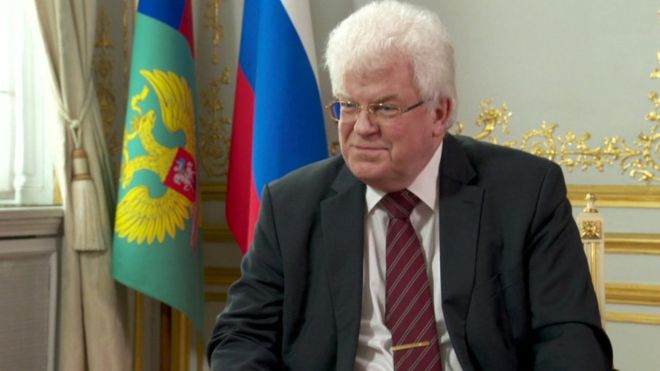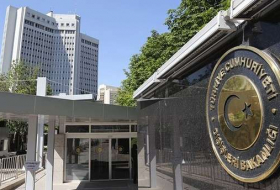Vladimir Chizhov told the BBC's Andrew Marr Show that Russia had "nothing to do" with the poisoning in Salisbury of Sergei Skripal and his daughter Yulia.
He said Russia did not stockpile the poison and that the Porton Down lab was only eight miles (12km) from the city.
The government dismissed his comments as "nonsense."
Retired military intelligence officer Mr Skripal, 66, and Yulia, 33, remain critically ill in hospital after being found slumped on a bench in Salisbury city centre on 4 March.
Theresa May had told MPs that personnel from the Defence Chemical Biological Radiological and Nuclear Centre at Porton Down in Wiltshire had identified the substance used on them as being part of a group of military-grade nerve agents developed by Russia known as Novichok.
Mr Chizhov told the BBC that Mr Skripal could "rightly be referred to as a traitor" but "from the legal point of view the Russian state had nothing against him".
Asked how the nerve agent came to be used in Salisbury, he said: "When you have a nerve agent or whatever, you check it against certain samples that you retain in your laboratories.
"And Porton Down, as we now all know, is the largest military facility in the United Kingdom that has been dealing with chemical weapons research. And it's actually only eight miles from Salisbury."
But pressed on whether he was suggesting Porton Down was "responsible" for the nerve agent in the attack, Mr Chizhov said: "I don't have evidence of anything being used."
He added: "I exclude the possibility of any stockpiles of any chemical weapons fleeing Russia after the collapse of the Soviet Union but there were certain specialists, including some scientists who today claim to be responsible for creating some nerve agents, that have been whisked out of Russia and are currently residing in the United Kingdom."
The Foreign Office said there was "not an ounce of truth" in his suggestion of a link to Porton Down.
A spokesperson said: "It's just another futile attempt from the Russian state to divert the story away from the facts - that Russia has acted in flagrant breach of its international obligations."
The Czech Republic has also rejected as "wholly unsubstantiated" and "highly speculative" claims that it was one of five countries most likely to have manufactured the nerve agent used to poison Sergei Skripal and his daughter.
Czech Foreign Minister Martin Stropnicky was responding to Russian foreign ministry spokeswoman Maria Zakharova who said that the most likely source of the nerve agent was Britain, the Czech Republic, Slovakia, Sweden or the United States.
On Saturday, the Russian foreign ministry said UK staff would be expelled from Moscow within a week in response to Britain's decision to expel 23 Russian diplomats.
It also said it would close the British Council in Russia, which promotes cultural ties between the nations, and the British Consulate in St Petersburg.
Writing in the Sun on Sunday, Foreign Secretary Boris Johnson described the closures as "futile" and said they would "only punish ordinary Russians" by depriving them of opportunities to learn English and apply for visas to visit Britain.
He added: "We have consistently taken a strong and principled stand against the Kremlin, and galvanised the international response...
"So I believe that what happened in Salisbury was, at least in part, the Kremlin's way of hitting back at Britain for standing firm against its appalling behaviour."
Earlier, Theresa May said the UK government would consider its next steps "in the coming days, alongside our allies and partners".
More about: spy
















































